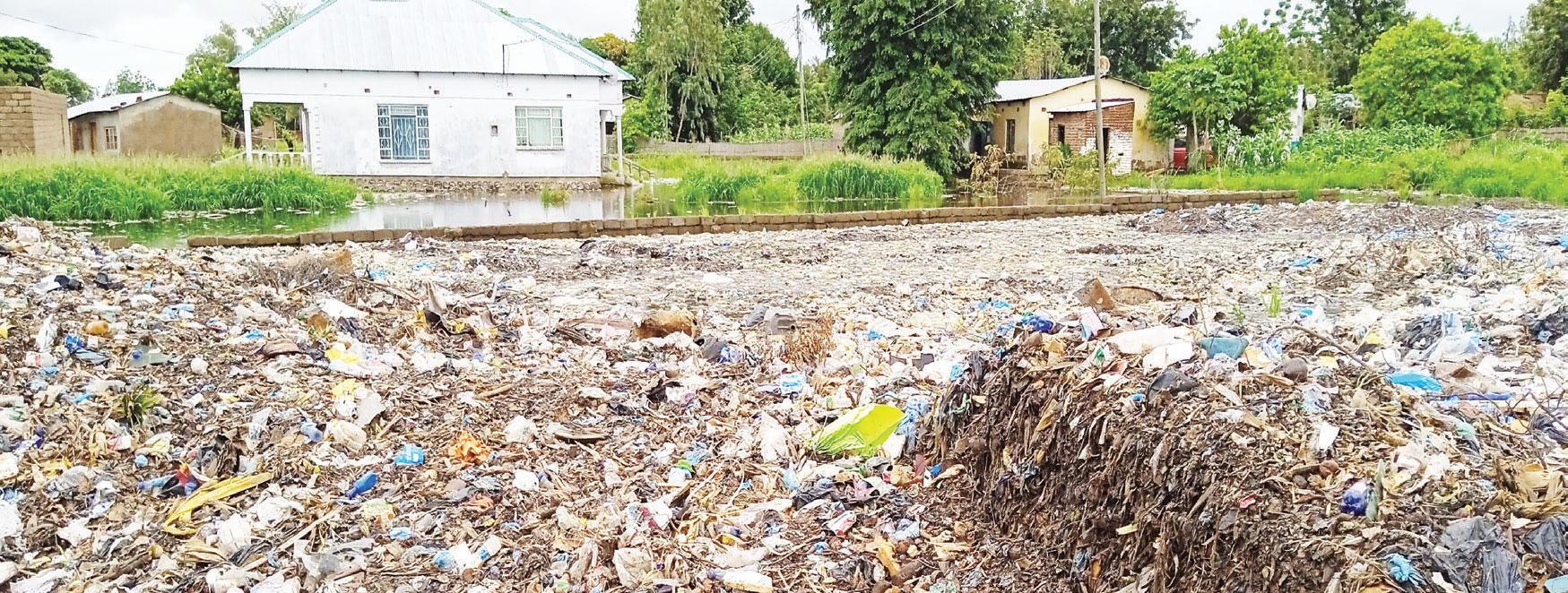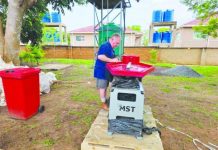Africa-Press – Malawi. Mangochi Municipal Council officials have opened a dumping site at an undesignated place, exposing residents to air pollution and diseases. YOHANE SYMON reports
A nauseating stench fills the air as hordes of flies waft into it every now and then. This has become the way of life for people who stay in 40 or so houses that surround the pit, measuring roughly between 30 and 32 square metres, which is partly filled with refuse.
Hips of waste, dropped by a tipper hours before, gives the topography a bumpy shape. Maybe, when heavy rains fall, they will level the ground again. With the incoming rains, the lower part of the site is filled with water. Baby diapers, plastic papers and other partly decomposed filth float freely on top of the water— bringing all sorts of germs from wherever to the place.
Looking closely, one discovers dead dogs, cats and other animals lying lifeless, the only living things being maggots and flies— creatures that thrive in unclean environments. Some of the maggots climb slowly on walls of one of the houses nearby, probably in search of dry places.
About one metre from the spot the stench is coming from, a woman, wearing a seemingly overused disposable facemask, is preparing breakfast for her family while some children play with dirty water that has become an integral part of their lives.
They seem not to care about the danger such materials pose to their lives. There is one person who is mindful, though; Jessy Mayenda, who keeps chasing the children away from the place.
Every day, Mayenda’s husband has to work up early in the morning to clear used baby diapers that make their way into their kitchen from the dumping site.
She then has to endure the strong smell while preparing food, which is later eaten in an environment where the air is polluted by the contaminated air from the dumping site.
In all fairness, the place is inhabitable for a human being. Mayenda falls short of words when asked about how Mangochi Municipal Council officials’ decision to turn the place into a dumpsite has affected her daily life.
“I do not know if we did something wrong to the council to deserve this. Sometimes, we feel like council officials want to punish us by dumping garbage within our homes,” Mayenda says.
She claims that her family is failing to work properly because it has to take children to the hospital frequently for diarrhea treatment. “This month alone, I have been to the hospital with my children twice,” she says.
Another resident of Mgundaphiri area, 59-year-old Wyson Adam, says people within the area are not happy with the decision by the council to create a dumping site at a place that was not designated for that purpose.
He says concerned residents have been engaging council officials, through meetings and other fora, to no avail. Adam claims that people around the area have greatly been affected by poor levels of hygiene.
Adam showed us health passports for people who have been taken ill in the past two months alone, and the frequency is mind-boggling. In the past two months, 37 residents have been to the hospital; diseases they have suffered from range from malaria, cholera, scabies and dysentery.
Using the health passports, we managed to see that, out of the 37 people in question, four of the people had been to the hospital up to three times between February 2 to 19 this year. And they all suffered from diarrhea.
“All we want is that the council should stop dumping waste matter here because its officials are violating provisions of laws that govern waste management. How can a person, in their normal senses, make a decision to dump garbage in a residential area?” wonders Adam.
Previously, the place used to serve as a playground for children from surrounding houses. But, for whatever reason, Mangochi Municipal Council workers started dumping waste material in the area.
Despite this, some small children continue to play at the place while scavenging for some valuables from the wastes. Apart from dirt, the place has become a breeding area for mosquitoes and flies. During the day, mosquito bites are more common than in other places at night.
The condition is worse at night, according to another concerned member Juma Mlauzi, whose house is partly covered in dumped materials. Mlauzi says, for the past three months, they have been visiting council offices to reason with duty-bearers to stop dumping waste in the area.
“Council officials told us that there was somebody who told them to be dumping the waste in the area to fill up the pit which was there so that he could be able to build a house when the pit is filled to the brim,” Mlauzi says.
But Mlauzi says the council did not mention the person. Their village headman is also not aware of the said person. Ward Councilor for the area Wellington Mangulenje is equally baffled.
He, however, admits that Mangochi Municipal Council, which was upgraded in August last year, is struggling to find a suitable place for dumping wastes.
At the moment, nobody knows where the council dumps liquid wastes which are pumped from septic tanks within the town. Just like the concerned people, Mangulenje says he has been demanding answers from the council, as regards waste dumping in the area.
We tried to establish the owner of the land to ask if indeed he asked the council to be dumping wastes at the place, but the council could not provide the name. We managed to witness a tractor belonging to the council dumping wastes in the area.
When we asked the driver why he was dumping the waste material, he said he was merely following instructions from his superiors. He could not mention the name of his superiors.
For a long time, Mangochi Municipal Council has been dumping wastes within the Mangochi Forest Reserve, which is a gazetted forest for indigenous trees.
However, the Department of Forestry is reported to have stopped the council from dumping wastes there on the basis that the wastes were damaging the ecosystem.
Since then, the council has been moving from one place to another, piling up hips of waste material, mostly in areas which are not designated for that purpose.
For instance, the council dumps wastes along the Mangochi-Monkey Bay Road near St Augustine 3 Primary School, just a few metres way from the main road.
Other piles of wastes are seen opposite Mpondasi Market along the same Monkey Bay Road, which is also close to houses and lodges. Lack of a proper drainage system makes matters worse as some waste materials find their way into homes with any small quantity of rainfall.
Mangochi Municipal Council Mayor Edna Yusuf Jose admitted that her council was not doing enough, in terms of waste management. She acknowledged that the council had been dumping wastes anyhow, a development that has, in the end, polluted the environment for council residents.
Just like Mangulenje and all concerned community members, the mayor does not know how council workers started dumping waste at Mgundaphiri. But Jose is sure that the council cannot start dumping wastes at a place without following procedures; meaning that there is somebody who approved the Mgundaphiri damping site..
She says, in the first place, council officials visit an area to see if it is not close to people’s houses before turning it into a dumping site. “Then, the council checks on the vastness of the land before declaring it a dumping site. All these processes must be followed beforehand. If these were followed, it means somebody neglected his or her duties,” she said.
She reveals that the council has just bought a piece of land which it wants to turn into a dumping site for solid wastes. At the moment, the council has no official dumping site for liquid waste..
Mangochi Municipal Council acting Director of Planning and Development Madalitso Mwenemurupa also admits that waste management is a nightmare for the council “just like it is with other councils”.
But she also explains that locals need to cultivate the habit of managing their wastes properly. Commenting on the issue of Mgundaphiri site, Mwenemurupa could not directly comment on who made the decision to start dumping wastes in the area.
But she says, before turning a place into a damping site, the environmental officer for the council has to make a proper assessment to ensure that the place is not close to people. She could not confirm if this process was followed.
She, however, says they, as a council, do not generate a lot of money to help them manage wastes as well as taking care of other business for the council.
“We do not get any money from the [Central] Government. We use our own money. So, at the moment, we require support from other organisations who can partner us in waste management and sanitation-related activities,” she says.
Mwenemurupa says, currently, the council has one refuse collection vehicle and a small wet wastes disposal vehicle, which are not enough to support the growing population of their area of jurisdiction.
For More News And Analysis About Malawi Follow Africa-Press






